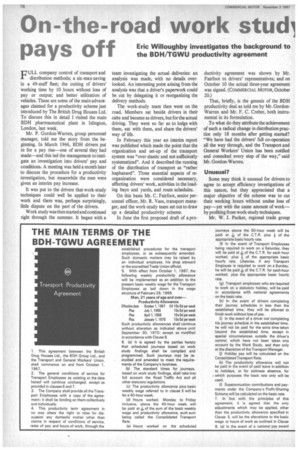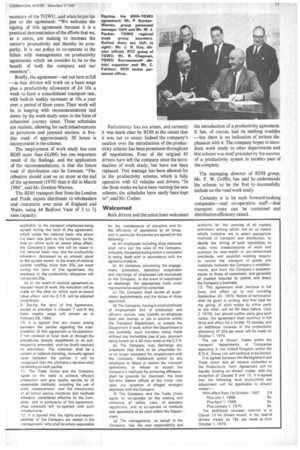THE MAIN TERMS OF THE BDH-TGWU AGREEMENT
Page 78

Page 79

If you've noticed an error in this article please click here to report it so we can fix it.
1. This agreement between the British Drug Houses Ltd.. the BDH Group Ltd.. and the Transport and General Workers' Union, shall commence on and from October 1, 1967.
2. The general conditions of service for Transport Employees as existing at the date hereof will continue unchanged, except as provided in clauses 6 and 7.
3. The Company shall provide all the Transport Employees with a copy of the agreement; it shall be binding on them collectively and individually.
4. This productivity term agreement in no way alters the right to raise for discussion any domestic matter other than claims in respect of conditions of service. rates of pay and hours of work, through the
established procedures for the transport employees, or as subsequently amended. Such domestic matters may be raised by an individual employee, his shop steward or the accredited Trade Union official.
5. With effect from October 1, 1967, the following weekly productivity allowance will be implemented as an addition to the present basic weekly wage for the Transport Employees as laid down in the wage structure of February 28, 1966.
Men, 21 years of age and over— Productivity Allowance Effective date October 1, 1967 Ed 1 Os Od per week Plus July 1. 1968 1 Cu Od per week Plus April 1, 1969 1 Ds Dd perweek Plus January 1,1070 1 Os Od per week Such productivity allowances shall continue without alteration as indicated above until September 30, 1970; except as modified in accordance with Clause B.
6. la) It is agreed by the parties hereto that scheduled journeys based on work study findings shall be compiled and programmed. Such journeys may be restudied and amended to meet the requirements of the Company's business.
(b) The standard times for journeys, based on work study findings, shall take into full account the Road Traffic Act and all other statutory regulations.
Ic) The productivity allowance plus basic weekly wage referred to in clause 5 will be fora 40-hour week.
(d) Hours worked, Monday to Friday inclusive, above the 40-hour week, will be paid at of the sum of the basic weekly wage and productivity allowance, such sum being called the Consolidated Transport Rate.
(e) Hours worked on the scheduled journeys above the 50-hour week will be
paid at 4, of the C.T.R. plus of the appropriate basic hourly rate.
If) In the event of Transport Employees being required to work on a Saturday, they will be paid at 4 of the C.T.R. for each hour worked, plus of the appropriate basic hourly rate. Likewise, if any Transport Employee is required to work on a Sunday, he will be paid 40Aof the C.T.R. for each hour worked, plus the appropriate basic hourly rate.
(g} Transport employees who are required to work on a statutory holiday, will be paid in accordance with national agreements on the basic rate.
(h) In the event of drivers completing their journey schedules in less than the established time, they will be allowed to finish work without loss of pay.
(0 In the event of a driver not completing his journey schedule in the established time, he will not be paid for the extra time taken beyond the established time, except in special circumstances outside the driver's control, which have not been taken into account by the Work Study, and then only at the discretion of the Transport Manager.
II) Holiday pay will be calculated on the Consol idated Transport Rate.
lk) The productivity allowance will not be paid in the event of paid leave in addition to holidays, or for sickness absence, for which purposes the basic rate only will be used.
(I) Superannuation contributions and payments under the Company's Profit-Sharing Scheme will be calculated on the basic rate.
7. In Hine with the principles of this agreement, it is agreed that the only adjustments which may be applied, other than the productivity allowance specified in Clause 5, will be the alterations to the basic wage or hours of work as outlined in Clause
8. (a) In the event of a national pay award applicable to the transport employees being agreed during the term of this agreement, which raises the national basic rate above the basic rate paid by the Company, on the date on which such an award takes effect, the Company's basic rate will be raised to the national basic rate, and the productivity allowance decreased by an amount equal to the agreed award. rn the event of national awards totalling more than 20s. per week during the term of this agreement, the decrease in the productivity allowance will not exceed 20s.
(b) In the event of national agreement on reduced hours of work, the reduction will be made on the date on which such an award takes effect, and the C.I.A. will be adjusted accord ngly.
9. During the term of this Agreement, except as provided in Clauses 7 and 8, the basic weekly wage will remain as at February 28, 1966.
10. It is agreed that any matter arising between the parties regarding the interpretation of this agreement or its operation, if not resolved at local level or through the procedures already established or as subsequently amended, shall be finally resolved by arbitration. The arbitrator shall be a person of national standing, mutually agreed upon between the parties; it will be recognised that the arbitrator's decision shall be binding on both parties.
11. The Trade Unionand the Company agree on the need to achieve efficient production and give quality service by all reasonable methods, including the use of work measurement, and the introduction of all labour saving machines and methods wherever considered effective by the Company; and in pursuance of this agreement, shop stewards will co-operate with such introductions.
12. It is agreed that the rights and responsibilities of the Company are vested in the management, who shall be solely responsible for the maintenance of discipline and for the efficiency of operations at all times. and in particular the parties are agreed on the follovinng: — (a) All employees including shop stewards shall carry out the rules of the Company, including the period during which a complaint is being dealt with in accordance with the agreed procedure.
(b) All decisions concerning the engagement, promotion, demotion, suspension and discharge of employees rest exclusively in the Company. In the event of suspension or discharge, the appropriate trade union representative would be consulted.
(cji The Company shall decide all supervisory appointments and the duties of those appointed.
dl The Company, having in mind continuity of employment and of production and efficient service, may transfer an employee from one journey or job to another within the Transport Department, or outside the Department if work within the Department is not -available, such transfers being made without any immediate loss of pay, payment being based on a 40-hour week at the C.I.A.
lel The Company may discharge any employee they think to be unsuitable for, or no longer necessary for, employment with the Company. Deliberate action by any employee to retard or restrict the transport operations, or refusal to accept the Company's methods for achieving efficiency. shall be grounds for dismissal. the local full-time district official of the Union may raise any question of alleged wrongful dismissal with the Company.
(f) The Company and the Trade Union agree to co-operate on the making and enforcing of safety rules, of statutory regulations, and to co-operate on methods and operations to be used within the Depart. ment.
(g1 The management, on behalf of the Company, has the sole responsibility and authority for the exercise of all matters prominent among which, but by no means wholly inclusive, are to select appropriate methods of transport and distribution, to decide the timing of such operations, to make time measurements of work and journeys by stop-watch or pre-determined standards, and establish working targets; to control the transport of goods and materials between the Company's establishments, and from the Company's establishments to those of customers; and generally all matters required to control and direct the Company's business.
13. This agreement shall continue in full force and effect up to and including September 30, 1970. Notice of termination shall be given in writing, and first date for the giving of such notice by either party to the other will be 90 days before, (July 2 1970), but should neither party give such notice, the agreement shalt continue in full force and effect for a further 12 months, and an additional increase in the productivity allowance of 20s per week will be made on October 1, 1970.
The use of drivers' mates within the transport departments of Companies operating in the United Kingdom within the B. D. H. Group Ltd, will continue to be limited.
It is agreed between the Management and Trade Union that all clauses embodied in the Productivity Term Agreement will be equally binding on drivers' mates, with the exception of Clauses 5 and 13. It is agreed that the following local productivity pay adjustment will be applicable to drivers' mates:—
With effect from 1st October, 1967 £4 PlusJuly 1, 1968 95.
Plus April 1. 1969 9s, Plus January 1, 1970 9s.
The additional increase referred to in Clause 13 for drivers would, in the case of drivers' mates, be 18s. per week as from October 1, 1970.








































































































































